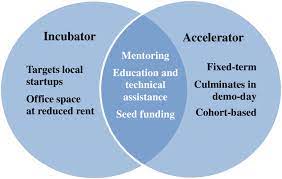Incubators vs. Accelerators: As the African startup ecosystem witnesses exponential growth, driven by innovative entrepreneurs and tech aficionados, various organizations and institutions are stepping in. They’re launching incubator programs specifically tailored to foster and speed up the development of these promising African startups
Incubator programs for startups in Africa are initiatives that provide critical resources, mentorship, and networking opportunities to early-stage businesses, helping them transform ideas into viable and sustainable enterprises. These programs aim to create an enabling environment for startups to thrive, overcome challenges, and tap into their full potential.
Some of the notable incubator programs for African startups include MEST (Accra, Ghana), CcHub (Lagos, Nigeria), Wennovation Hub (Lagos, Nigeria), and BongoHive (Lusaka, Zambia), amongst others. These initiatives have played a crucial role in nurturing successful startups that have gone on to make significant impacts in their respective industries.

Are Startup Incubators Free?
Startup incubators can have varying cost structures. While some startup incubators offer their services for free, many others may charge fees or equity in exchange for the support and resources they provide to startups. It’s essential to research and inquire about the specific terms and conditions of each incubator to determine whether they are free or involve any costs.
Are Accelerators and Incubators the same?
No, they are not, and we will be looking at a number of subtle differences that differentiate an Accelerator from an incubator program in the paragraphs below.
Recommended reading: 5 Important Benefits of Global Accelerators for African Startups
Accelerators vs Incubators: Which is Best for Your Startup?
What is the Difference Between a Startup Incubator and Accelerator?
Startup Incubator:
- Focus: Incubators are designed to support early-stage startups in developing their business ideas, products, and services.
- Duration: Incubator programs typically have a longer duration, often spanning several months to a year or more.
- Support: Incubators offer resources such as office space, mentorship, networking opportunities, and educational programs.
- Stage: Incubators work with startups in their early stages, helping them refine their concepts before scaling.
- Equity: Incubators may or may not take equity, but it’s generally less common compared to accelerators.
Startup Accelerator:
- Focus: Accelerators aim to accelerate the growth of startups that are already at a certain stage of development.
- Duration: Accelerator programs are usually shorter, lasting around three to six months.
- Support: Accelerators provide intensive mentorship, networking, and resources to help startups rapidly scale and gain market traction.
- Stage: Accelerators typically work with startups that have a minimum viable product (MVP) and are ready to scale.
- Equity: Many accelerators provide funding in exchange for equity, aligning their success with the startups they support.
Both startup incubators and accelerators play vital roles in nurturing and advancing early-stage businesses, but their focuses, durations, and approaches differ to accommodate the unique needs of startups at various stages of development.
Accelerators:
Accelerators are time-limited, intensive initiatives that typically span a few months, usually three to six. They aim to fast-track a startup’s growth and expansion, usually accepting ventures with an already developed minimum viable product (MVP) and some initial market traction.
Key characteristics of accelerators include:
- Accelerators provide a well-organized curriculum that covers various aspects of business development, such as refining products, validating markets, acquiring customers, and strategies for fundraising.
- Participating startups receive mentorship from experienced entrepreneurs, industry experts, and successful business leaders. They also gain access to a wide network of potential investors and partners through networking events.
- Many accelerators invest seed funding in startups in exchange for equity. This financial support is typically used to sustain the startup during the program and facilitate further growth.
- Accelerator programs often culminate in a demo day, where startups present their businesses to a gathering of investors and stakeholders, seeking additional funding and support.
Incubator:
Incubators are long-term programs that focus on nurturing startups from the early ideation stage to the establishment of a sustainable business model. Incubators may accept startups at various development stages, including those with just a concept or idea.
Key characteristics of incubators include:
- Incubator programs provide foundational support to startups, including mentorship, workspace, and access to resources. The focus is on refining the startup’s business model and product.
- Incubators do not have a fixed timeline and offer a more flexible duration compared to accelerators. They can support startups for several months to a few years, based on the unique needs of each venture.
- Incubators emphasize the overall development of the startup and its founders. They provide a nurturing environment that encourages experimentation, learning, and iterative progress.
- Incubators often assist startups with market entry strategies, customer acquisition, and navigating regulatory challenges.
Choosing the Best Fit for Your Startup?
Selecting between an accelerator and an incubator depends on your startup’s specific stage of development and objectives: Accelerators are most suitable for startups with a validated product, early traction, and a desire for rapid scaling. If your startup seeks swift growth, access to investors, and intensive mentorship, an accelerator might be the optimal choice.
On the other hand, incubators are ideal for early-stage startups that require more time to refine their business model, product, and market strategy. If your startup needs foundational support, mentorship, and a nurturing environment for idea development, an incubator may be the more appropriate option.
Recommended reading: 15 Best Global Accelerators for African Startups in 2023
Conclusion:
The decision between incubator and accelerator programs depends on the unique needs and goals of each African startup. Incubators are the cradle of innovation, offering ample time for discovery and development.
Accelerators, in contrast, propel startups forward with an intensive and rapid approach to growth. Whether nurturing ideas or scaling established ventures, both paths contribute significantly to the advancement of African entrepreneurship, shaping a landscape of innovation and impact.
